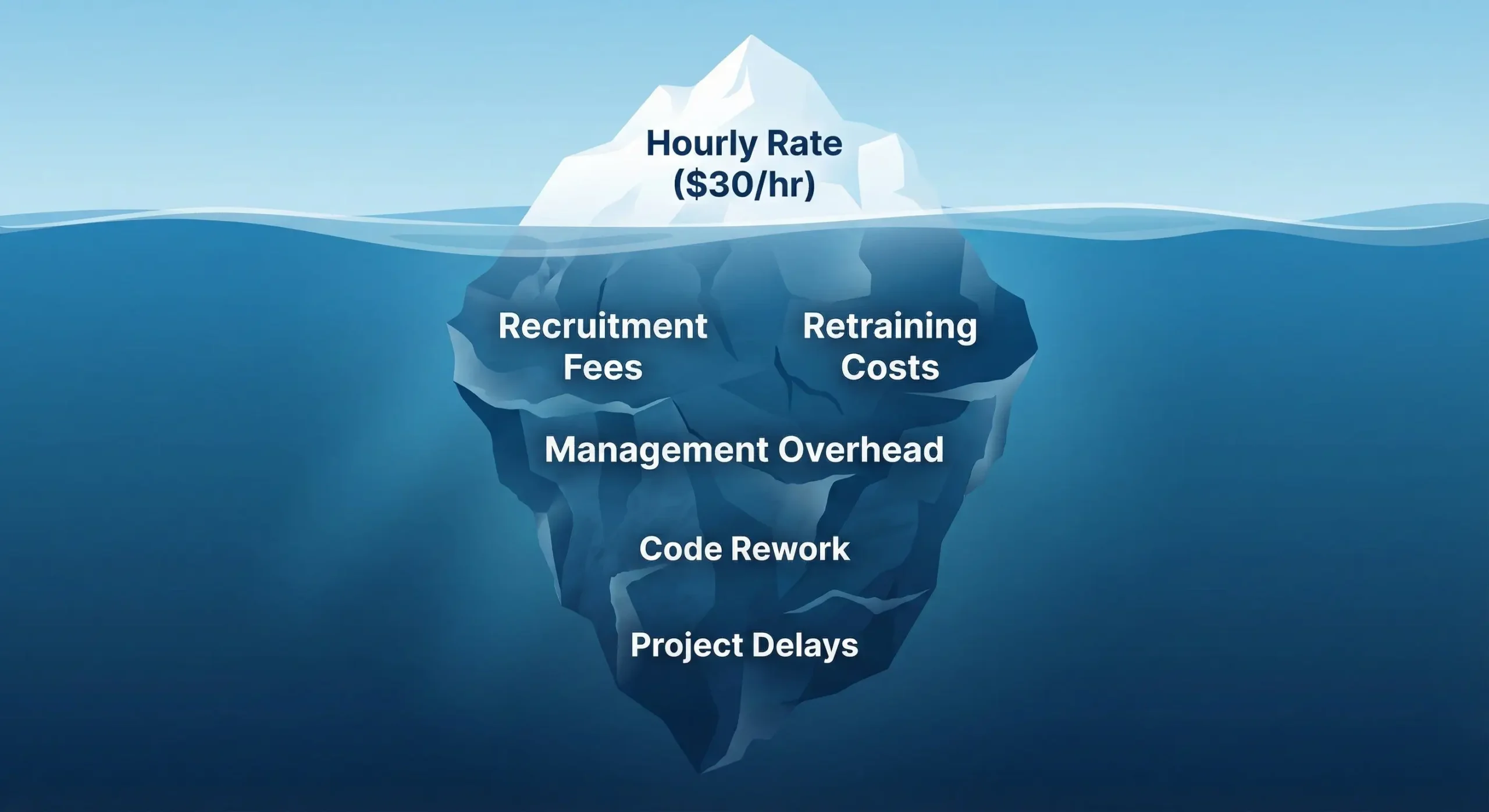Australian startups in 2025 face an environment defined by rising talent costs and persistent skills shortages. Traditional hiring strategies are no longer enough to meet the speed, scale, and expertise required to compete in a global digital economy. As a result, many founders are turning to offshore teams not only as a cost advantage but as a strategic tool to access specialized talent, accelerate growth, and strengthen operational resilience.
High Cost and Talent Constraints Domestically
In 2025, high costs and acute talent shortages have become defining barriers for Australian startups. The average salary for an Australian software developer now rises above AUD 150,000 once superannuation, payroll tax, and other employment overheads are included. For experienced professionals, this total can reach as high as AUD 180,000–200,000 per year.
At the same time, the country faces one of the most severe tech skills shortages on record, with the Technology Council reporting a need for an additional 286,000 tech workers and nearly 36% of all assessed occupations in national shortage. This supply-demand imbalance is driving up recruitment costs, lengthening hiring times, and putting immense strain on early-stage ventures, making offshoring a practical solution for many founders.
Access to Global Expertise Beyond Local Constraints
Offshore teams empower Australian startups to go far beyond the limits of local hiring by granting access to global expertise and highly specialized skill sets. With shortages of software engineers, cyber specialists, and data analysts at home, founders are leveraging offshore talent in regions like Southeast Asia to fill critical technical roles, often accessing skills and experience simply unavailable locally. Nepal, in particular, is gaining traction for its growing pool of healthcare IT specialists, competitive cost structures, and alignment with Western business practices, offering australian startups access to skills and experience that are often unavailable locally.
This “borderless” approach allows startups to assemble cross-functional teams with deep knowledge in areas like AI, advanced software development, and UX at a fraction of domestic costs. Offshore professionals are fully integrated, collaborating via cloud tools and daily standups, that bring both innovation and operational excellence to the table. For ambitious startups, casting a wider net for talent would be a strategic move enabling faster scaling, stronger capabilities, and a true competitive edge on the global stage.
Cost-Effective Scaling and Flexibility
Offshore teams offer Australian startups a pathway to cost-effective scaling and unparalleled flexibility. By engaging offshore talent, companies can ramp their workforce up or down quickly to match evolving business demands, without the long-term commitments and overheads of local full-time hires. Outsourcing roles like software development, operations, or engineering means startups can reduce labour costs by 50–70%, freeing up capital to invest in core product development, marketing, or global expansion. This flexibility is especially valuable for early-stage ventures navigating market volatility or launching new products.
Offshore partners also provide access to scalable resources on-demand, enabling startups to increase team size for major releases or scale back after project completion which is difficult to achieve with purely local staffing models. The result is a more agile, financially resilient business ready to pivot, grow, and seize new opportunities as they arise.
Faster Market Entry and Continuous Development
Offshore teams enable Australian startups to achieve faster market entry and maintain continuous development which is a crucial advantage in the hyper-competitive 2025 tech landscape. By leveraging time zone differences and “follow-the-sun” operating models, development work can continue almost 24/7, dramatically shortening project timelines and accelerating product releases. For example, an Australian startup working with a Nepal-based software team can hand off code at the end of its local workday, allowing the offshore team to continue development overnight. By the next morning, the Australian team can review progress and push new updates, effectively creating a near-continuous development cycle.
Rather than waiting weeks or months to build or scale an in-house team, founders can onboard offshore developers, designers, and QA specialists in days, jumpstarting MVP development or new feature rollouts. This speed is especially vital for startups aiming to capture market share or respond quickly to shifting customer needs. Ultimately, offshore models empower startups to outpace competitors and deliver value sooner, strengthening their position in both local and international markets.
Focus on Core Strengths and Strategic Growth
Offshore teams empower Australian startups to focus on their core strengths and drive strategic growth by delegating operational or repetitive tasks to global specialists. This allows founders and key local staff to zero in on product innovation, business development, and customer relationships, rather than being bogged down by development sprints or routine support.
Case studies in Australia have shown that startups leveraging offshore talent in regions like Southeast Asia and Eastern Europe reduced operational costs by up to 40% and accelerated product launches, all while maintaining high quality and agility. By freeing local teams to work on mission-critical initiatives, offshoring functions as a growth catalyst by helping startups refine their strategy, capture new markets, and strengthen their competitive edge.
Offshore Outsourcing Is Now Mainstream in Australia
Offshore outsourcing has become a mainstream business strategy for Australian startups and SMEs in 2025, shedding its old reputation as merely a cost-saving tactic. Recent industry data reveals that more than 70% of Australian tech startups and scale-ups now engage some form of offshore talent, whether for software development, marketing, design, or customer support.
Shifts in remote work culture, widespread acceptance of distributed teams, and the availability of integrated collaboration platforms like Slack and Jira have made it easy for offshore professionals to fully participate as members of the core team. As a result, offshoring is no longer seen as experimental or “risky”, but it’s recognized as a strategic, reliable, and scalable way for Australian companies to remain competitive and agile in a global digital economy.
Strategic Guidelines for Startups Considering Offshore Teams

For Australian startups exploring offshore models, success depends on adopting the right practices from the start. A few key guidelines include:
- Pilot Before Scaling: Begin with a smaller, low-risk project. This allows startups to test processes, build trust, and evaluate team compatibility before committing at scale.
- Prioritize Communication: Offshore collaboration requires structured communication. Tools like Slack, Jira, or Microsoft Teams, combined with scheduled overlapping work hours, ensure that offshore and local teams remain aligned.
- Integrate Culture Early: Offshore staff should feel like an extension of the startup, not a separate unit. Setting clear KPIs, sharing vision and values, and running regular demos foster a sense of ownership and accountability.
- Enforce Quality Controls: Strong QA processes, regular code reviews, and structured feedback loops help maintain performance and standards across distributed teams.
By focusing on these principles, startups can reduce risks, strengthen offshore collaboration, and build a sustainable model that scales with the business.
Why Choose TechKraft as an Offshore Partner in Nepal
For Australian startups, the decision to work with offshore teams is not just about cost savings but about building reliable, scalable, and compliant solutions. TechKraft helps founders achieve this by offering access to specialized talent pools, proven expertise in healthcare and enterprise technology, and a Build Operate Transfer (BOT) model that ensures long-term sustainability.
By combining technical excellence with an understanding of business needs, TechKraft enables startups to innovate faster and operate with confidence. For founders navigating competitive markets in 2025, choosing the right partner is as important as choosing the right strategy.
Schedule a meeting with us today.



